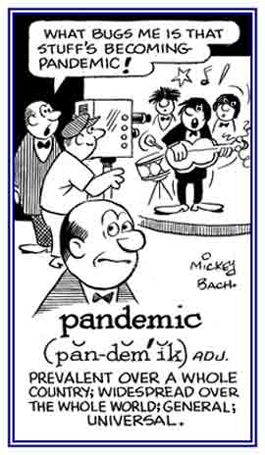The pandemic enthusiasm for soccer spread like an epidemic among the fans; especially, those for whom soccer is endemic to their culture.
2. Relating to illnesses that affect the majority of a population in a large region; such as, a disease that is widespread at the same time in many parts of the world: AIDS is currently considered to be a pandemic problem, but this term has also traditionally included such disorders as cholera, plague, and influenza. 3. Etymology: from 1666 which came from Greek pandemos, "pertaining to all people"; from pan-, "all" + demos, "people".

Go to this Word A Day Revisited Index
so you can see more of Mickey Bach's cartoons.
With all the news in the media, SARS (Severe Acute Respiratory Syndrome) is rapidly becoming a phobia that is spreading panic around the world. Consider the following headlines:
1. SARS Alarmism, When Fear Is A Virus: First there was denial, then sluggish response›and now irrational fear.
2. Fear Aiding Spread of Sickness, Health Officials Say: The care of many patients with a mysterious respiratory illness is being seriously jeopardized because nurses and other health care workers are staying home and refusing to treat them, officials at the World Health Organization said.
3. SARS: From China’s Secret to A Worldwide Alarm: Last November in Foshan, a small industrial city in Guangdong province in southern China, a businessman became desperately ill with an unusual type of pneumonia. Doctors could not identify the germ that was making him sick. Omniously, although pneumonia is not usually very contagious, the four health workers who treated him also fell gravely ill with the same disease.
4. In Hong Kong, Fast-moving SARS sets off alarms: A fast-growing cluster of killer pneumonia infections in a Hong Kong housing estate fueled fears that the disease known as Severe Acute Respiratory Syndrome, or SARS, may be more contagious than experts believed.
5. Fear of Respiratory Disease Stymies Swiss Jewelry Fair—Many Exhibitors Barred by Medical Authorities: When Swiss health officials decided last week, just before the show was to begin, that exhibitors and buyers from places affected by SARS would not be allowed to attend because of concerns about spreading the virus, the show became a debacle.
6. SARS Could Slow Asia Industry—Fall in Business Trips Threatens China’s Computer Sector: In Hong Kong, companies and consumers bought every desktop, laptop and notebook computer theY could find as more and more people worked from home often with their employers’ encouragement, for fear of becoming infected if they showed up at their work stations.
7. Fear of War and Illness Hurt Asia Travel: The war in Iraq and the outbreak of a mysterious respiratory ailment that began in China are combining to wreak havoc on tourism in Asia. “This has definitely affected the city,” said Tina Liu, communication manager at the Grand Hyatt in Shanghai. “We’re experiencing cancellations›more from the virus than the war.”
8. Thousands Quarantined in Beijing to Curb SARS: China implemented a sweeping quarantine on thousands of Beijing residents who have had contact with suspected carriers of a highly infectious respiratory illness, as the Communist government began using its massive police powers to combat a national health crisis. Dense crowds of temporary laborers descended on major train stations seeking emergency passage out of the city.
9. Fear of SARS and Fear Itself: We’re all within the reach of fear; fear of the unknown and the half known. Every day brings news of the spread of the killer virus. You could say that this is all alarmist nonsense. More people die from diarrhea or flu than SARS, and the risk to any particular individual is small; but one person taking the disease into Hong Kong practically crippled the health system there. One person brought SARS into Toronto and shut down two hospitals. More devastating than the human cost of the virus is the damage it is inflicting on fragile economies of all kinds.
There is much more that could be presented here, but it should be sufficient to convince you that there is a SARSphobia which has spread throughout the world.
